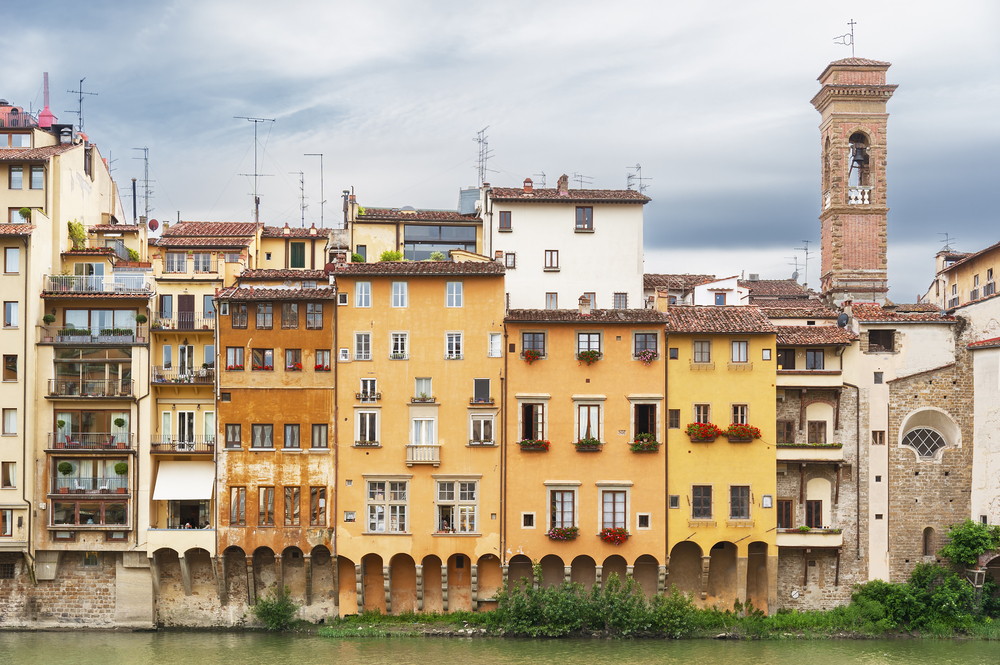Real Estate: Country Rental Fact Sheet
Welcome to Italy!
Like other top European countries, housing is in high demand throughout Italy. Apartments are by far the most common type of housing, found concentrated mostly in urban neighborhoods. Although, renters wanting a quieter environment with more space will want to look outside city centers to the suburbs, which are more affordable, private, and spacious. However, those commuting should be sure to pick an area that is well connected to the city center by public transportation. Rental costs range from affordable in cities such as Naples, Turin, and Catania to costly in Rome, Venice, and Milan, the country’s most affluent locales. Expats living in the country enjoy a high quality of life, efficient public transportation, modest cost of living, and relaxed atmosphere. Italy is known for its incredible hospitality, and those committed to living in the country long-term typically find local people to be warm and welcoming. Although Italian is the primary language, expats will find that many locals can communicate in English.
Types of Rental Properties
- Apartments are the primary type of accommodation available in Italy. Most buildings are multi-story complexes, with ground floors often home to businesses such as bakeries or grocery stores. The higher up a tenant lives in the building the more expensive the rent. Apartments typically include a combined kitchen and living area, along with bedrooms and a small storage area. Some apartments have balconies or access to rooftop gardens. Newer apartment developments tend to be more spacious—though come at a higher cost—and are more likely to include common areas such as a gym or laundry facility. Apartments in historic buildings tend to be very small, and despite their visual appeal, the buildings’ aging nature means maintenance issues are frequent.
- Single-family houses, referred to as villas, are difficult to find in Italy, and when available they will be very expensive. Mostly found on the outskirts of cities, villas are typically bought and sold, not rented in Italy. They are more commonly available as short-term rentals.
Expat Cities
Italian cities popular with expats include Rome, Milan, Bologna, Palermo, Trento, and Naples. Most expats in Italy find themselves comfortably living in the bustling neighborhoods surrounding the city center. Those wanting quieter surroundings should look toward the outskirts. Public transportation such as trains, trams, subways, and buses help ensure even distant suburbs are well connected to city centers.
How to Find a Rental
It is common for Italian apartment owners to lease their property through a property manager; therefore, connecting with a property manager or real estate agent is typically the best way to secure a rental. Property managers also can assist in negotiating rental contracts. International real estate companies handling sales and rentals such as RE/MAX (www.remax.eu/en/region/italy) and Sotheby’s (www.italy-sothebysrealty.com) have English-speaking agents with offices in Italy. There also are online classified ad sites such as Subito (www.subito.it) and Bakeca (www.bakeca.it). In addition, some of the most popular online portals for rental properties include:
|
|
Rental Rates and Fees
Below is a table of average monthly rental rates for apartments by size and location for standard and deluxe accommodations.
| In City Center | Average Monthly Rate | Range | Outside City Center | Average Monthly Rate | Range |
| 1-bedroom | €946 | €750–€1,200 | 1-bedroom | €654 | €500–€900 |
| 3-bedroom | €1,962 | €1,400–€3,000 | 3-bedroom | €1,208 | €900–€1,700 |
- Before renting, check to make sure that the unit’s dimensions are reported as “useable size” rather than “official size,” as the two figures can vary dramatically.
- Monthly rent is generally quoted as “all inclusive,” meaning that all applicable fees and taxes are already factored into the price. If the quoted rental amount is “exclusive,” condominium fees and municipal taxes will generally add 5–10 percent on top of the monthly rent.
- To rent a property in Italy, you must possess a valid Permesso di Soggiorno (Permit of Stay). The process to obtain a permit can take up to two months; therefore, it may be a good idea to secure a short-term rental while you check clerical boxes and search for a place to live.
- A fee of one- or two-months’ rent is paid to the real estate agent for their services in securing a long-term rental.
Lease Terms
Restrictions
The restrictions on renting property in Italy have to do with clerical matters. Those renting long term properties in Italy must possess a Permesso di Soggiorno (permit of stay). There are no restrictions on who can receive a permit of stay, just that they must be in possession of a valid visa. A permit of stay is a requirement for renting property.
If an individual is staying in Italy for two or more years, they must also apply for a Certificato di Residenza (Certificate of Residence.) To sign a lease longer than two years, one must possess a valid certificate of residence.
Duration
In Italy, there are three common lengths for rental agreements. A transitory rental agreement is the most common and lasts 12–18 months. There also is the option to sign a three-year contract with a guaranteed extension of two years if the tenant desires, or a four-year contract with a guaranteed extension of four years if the tenant chooses.
Deposits
A refundable security deposit equal to up to three months’ rent may be required by a landlord. It is illegal for landlords to request more than that amount for a deposit.
Pets
Renters should check with landlords about the possibility of having a pet. Legally, the Italian Civil Code says landlords cannot prohibit the keeping of pets, although individual rental contracts may state differently and would take precedence once signed.
Legal Issues
- Timely payment of rent is essential in maintaining a good relationship with the landlord and ensuring utilities remain active. If a tenant is late paying rent, Italian landlords must send them a warning letter prior to starting any eviction proceedings. Landlords have the right to remove tenants who are disruptive, destructive, or are using the property for illegal purposes.
- A breach of contract also allows your landlord to begin eviction proceedings. Breach of contract includes subletting the apartment, damaging the space or its contents, or violating the rental agreement in any manner.
- Without proving breach of contract, it is illegal for landlords to evict tenants.
- Upon moving to a new residence, your landlord must register your presence with the local police department. The contract also will be registered with the Internal Revenue Service for tax purposes.
Amenities
Furnished vs. Unfurnished
Apartments are generally rented semi-furnished with essential appliances such as a hot water heater, refrigerator, and stove. Unfurnished apartments are typically bare, often without light fixtures, curtains, or major appliances. Fully furnished apartments will include all major appliances as well as basic furniture. Many expats report that landlords are reluctant to change the furniture available in an apartment.
Parking
Most expats do not have cars in Italy as public transportation is convenient and cheap. Most apartments do not come with a parking space, and if they do, there is an additional charge. Those planning to drive in the country must maintain an Italian residence for more than one year and possess a valid driver's license from a European Union country.
If you do own or rent a car in Italy, parking can be difficult to find. Apartment buildings don’t typically include parking facilities. You may be forced to use on-street parking or secure a monthly parking space in a nearby public parking lot.
Utilities
Most rentals do not include utility service. Electricity, gas, and water should be secured by the landlord, but the tenant will be metered and billed monthly for their use. Telephone landline and internet are likely already connected to the apartment, but you will have to transfer these services to your name, which will require a codice fiscal or tax code.
Telephone Landline
In Italy, Telecom Italia or TIM (www.tim.it) is the largest telephone landline (fixed line) provider. TIM installs all landline and DSL internet connections, even if you pay for the service through another company. TIM also offers mobile phone and internet services that can be packaged with a telephone landline. New accounts are easily arranged by phone or online.
Internet and Bundled Services
In addition to Telecom Italia or TIM (www.tim.it), popular internet service providers include Tiscali (www.tiscali.it), Wind Tre (www.windtre.it), Vodafone (www.vodafone.it), and Fastweb (www.fastweb.it). Fixed-rate packages for bundling telephone landline, internet, and mobile phone services are available. New accounts are easily arranged by phone or online.
Electricity
The main electricity provider in Italy is ENEL (www.enel.com). Landlords often secure the electricity for their rental properties, and then tenants pay them for their monthly usage. If the landlord does not setup service, you need to activate your electricity by phone and should have an Italian speaker to assist, as operators do not speak English. The following information will be needed: identity document; client number of previous tenant; tax number; amount of power required (3, 4, or 6 KW); current meter reading; bank details if planning to pay by debit; billing address; and address to which contract should be sent. Bills are sent every two months.
The standard electrical voltage is 230 volts AC, 50 hertz, using type C and type F plugs that have parallel round pins. Most European devices will work in Italy with simple plug adapters. American devices, which are designed for 110- and 120-volt electricity, will require voltage converters or transformers in addition to plug adapters.
Water and Sewage
Tap water in Italy is closely regulated and considered safe to drink. The Italian government oversees the distribution of water and collection and processing of sewage throughout the country. Your landlord will be charged for your water usage twice a year, and then you will pay the landlord directly.
Gas
The main piped natural gas (PNG) providers in Italy are Italgas (www.italgas.it), Enel (www.enel.com), and Eni (www.enigaseluce.com). Landlords are typically responsible for securing this service. Monthly usage is based on meter readings and payments are made to the landlord.
Waste and Recycling
The Italian government manages solid waste collection throughout the country. Residents dispose of their household waste in large public containers found on most blocks in big cities. Refuse is separated into garbage, recyclables, and organic waste. Failure to appropriately separate solid waste can result in fines.
Making Payments
Most payments for utilities will be paid through your landlord. It is recommended to pay your landlord using an electronic payment method to ensure consistent documentation. If paying with cash, be sure to collect a receipt for the transfer of funds. If paying your utilities directly, you can typically do this at your local bank, a nearby post office, or using online payment portals. Internet and mobile phone services can be paid using the provider’s online payment system.
FAQs
Can I negotiate my lease?
The monthly rental of properties can usually be negotiated unless already specified by the landlord. The majority of negotiations will be regarding a fully “inclusive” monthly price that already factors in any government fees, included utilities, and management costs. An “exclusive” price does not include these costs, which should be added to determine your total monthly budget. Most landlords will not budge more than 10 percent from their stated rental price.
Should I have renter’s insurance?
Renter’s insurance is not common in Italy. Landlords are not required to insure their properties. If you want to protect your belongings from theft or damage, renter’s insurance is available, but it is not required.
Article written for World Trade Press by Taylor Holloran, Felicia Topp, and Brielle Burt.
Copyright © 1993—2025 World Trade Press. All rights reserved.

 Italy
Italy 

